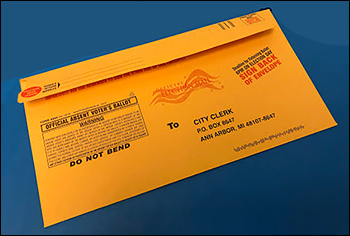By Jim Ellis
 Oct. 20, 2020 — The Michigan Court of Appeals on Friday reversed a lower court ruling that allowed a post-election ballot reception period that would have lasted until Nov. 17, and granted the process known as “ballot harvesting,” where another individual or individuals can deliver unspecified numbers of ballots for voters.
Oct. 20, 2020 — The Michigan Court of Appeals on Friday reversed a lower court ruling that allowed a post-election ballot reception period that would have lasted until Nov. 17, and granted the process known as “ballot harvesting,” where another individual or individuals can deliver unspecified numbers of ballots for voters.
The three-judge high court unanimously overturned a ruling from Court of Claims Judge Cynthia Stephens who made the original directive in deciding an election lawsuit that the Michigan Alliance for Retired Americans, a union-funded organization, brought forth.
When the Michigan attorney general and secretary of state jointly decided not to appeal Judge Stephens’ ruling, the Republican controlled state House and Senate filed the motion and were granted standing. It is unclear now whether the Michigan Alliance will appeal to the state Supreme Court.
According to the Detroit News’s reporting, the original ruling contained the directive that the ballots must be postmarked by Nov. 3. That clerical distinction, however, will be difficult to enforce once we advance into the post-election counting and challenge stage.
The US Postal Service, themselves, according to their employee practices handbook, indicate that many mail pieces do not require postmarks. In most of the 21 states that are now allowing the post-election reception period, the ballots will fall into one of these categories thus making the postmark question moot, and that will invariably lead to further lawsuits and litigation. Below is the official language for the postmark directives:
“Postmarks are not required for mailings bearing a permit, meter, or precanceled stamp for postage, nor to pieces with an indicia applied by various postage evidencing systems.”
The Appellate Court ruling means, at least until if and when the state Supreme Court addresses the issue, that there will be no post-election ballot reception period in Michigan. Ballot harvesting pertaining to individuals who are not immediate family members of the person wanting to vote absentee or is not an election office clerk, will again be prohibited. Therefore, all ballots are required to be in the possession of election authorities throughout Michigan’s counties before the polls close on Election Day, Nov. 3.
The ballot reception period appears to be one of the major focal points of so many states having trouble with mail voting in the primary. In New York, which appeared to have the worst problems, the June 23 election was not formally decided until the middle of August because an avalanche of mail ballots came into voting centers. Other states with significant problems were Pennsylvania, Maryland, Georgia, Kentucky, and Nevada, among others.
Oregon was the first state to venture into predominant, or all-mail, voting back in the 2000 election. Therefore, the state authorities have 20 years of experience in handling the procedure and now have relatively have few problems. Oregon also requires all ballots to be received by Election Day, just as one of the other predominantly mail voting states, Colorado, does. Most of the other states expanding their absentee ballot mail programs are apparently not looking to the Oregon model for guidance, however.
The other two all-mail or predominantly mail states, Washington and California (Utah is joining this group on a permanent basis this year), allow post-election ballot reception periods. Washington permits votes to come into county centers through the Friday after the election, while California has extended their period all the way to Nov. 20 this year.
California, because they have been notoriously slow in verifying and counting ballots, already take approximately one month to produce final numbers. In the last election, six US House races flipped from Republican to Democrat in the post-election counting process, providing a strong example of the extension’s significance.
Among the key states extending the ballot reception period is Pennsylvania, and they are even going further although the rulings are being challenged. The state Supreme Court changed the election laws to allow the post-election ballot reception period to go through Friday, Nov. 6, but did not allow ballot harvesting. Ballot receptacles will be located throughout the state where votes can be deposited other than in a US mailbox.
Additionally, however, the Pennsylvania secretary of state has issued a directive to the county clerks telling them they are prohibited from verifying a person’s signature on their absentee ballot with the signature on their voter registration card. This, too, is being challenged, and it is unclear whether the Secretary of State has the power to order the individual county clerks over what verification procedures they may or may not use.
Depending upon the closeness of the national election and various US Senate and House results, issues such as those discussed here will become the focal point of the after-election period. With more states changing their laws and attempting new procedures for the first time, it is very likely we will see a period of chaos in many places, particularly if the presidential election doesn’t have a clear victor or trend on election night.
